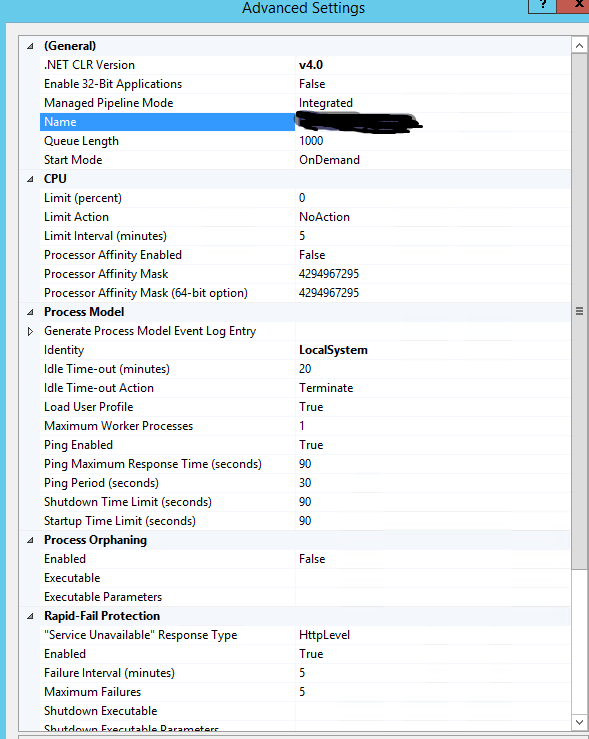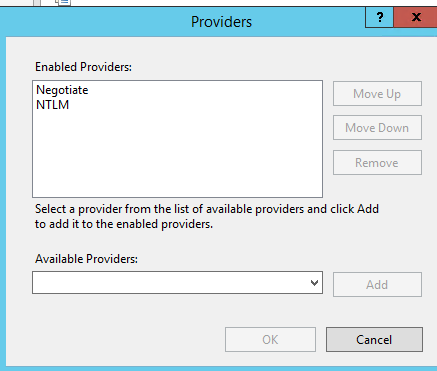Answer the question
In order to leave comments, you need to log in
How to pass Windows Credentials from client to WCF?
Good day ... Although for the third day my head has been spinning. So we have a WPF client and an IIS service.
Client configuration:
<system.serviceModel>
<bindings>
<basicHttpBinding>
<binding name="TrackingHoursServiceBinding" maxReceivedMessageSize="2147483647" useDefaultWebProxy="False">
<readerQuotas maxDepth="32" maxStringContentLength="20000" maxArrayLength="2147483647"
maxBytesPerRead="4096" maxNameTableCharCount="16384" />
<security mode="TransportCredentialOnly">
<transport clientCredentialType="Ntlm"/>
</security>
</binding>
<binding name="BasicHttpBinding_ITFSService" />
</basicHttpBinding>
</bindings>
<client>
<endpoint address="http://______TrackingHoursService.svc" binding="basicHttpBinding"
bindingConfiguration="TrackingHoursServiceBinding" contract="ITrackingHoursService"
name="WSHttpBinding_ITrackingHoursService">
<identity>
<dns value="localhost" />
</identity>
</endpoint>
<endpoint address="http://_____/TFSService.svc" binding="basicHttpBinding"
bindingConfiguration="BasicHttpBinding_ITFSService" contract="ITFSService" name="BasicHttpBinding_ITFSService" />
</client>
</system.serviceModel><system.serviceModel>
<protocolMapping>
<add scheme="https" binding="basicHttpBinding" bindingConfiguration="TrackingHoursServiceBinding"/>
</protocolMapping>
<serviceHostingEnvironment multipleSiteBindingsEnabled="true" />
<client />
<bindings>
<basicHttpBinding>
<binding name="TrackingHoursServiceBinding" maxReceivedMessageSize="620000">
<security mode="TransportCredentialOnly">
<transport clientCredentialType="Ntlm" />
</security>
</binding>
<binding name="BasicHttpBinding_IPortableService" maxBufferSize="2147483647" maxReceivedMessageSize="2147483647" receiveTimeout="00:10:00" sendTimeout="00:10:00" />
</basicHttpBinding>
</bindings>
<services>
<service behaviorConfiguration="_.TrackingHoursServiceBehavior" name="_.Service.TrackingHoursService">
<endpoint address="" binding="basicHttpBinding" bindingConfiguration="TrackingHoursServiceBinding" contract="_.Service.ITrackingHoursService">
<identity>
<dns value="localhost" />
</identity>
</endpoint>
<endpoint address="pcl" binding="basicHttpBinding" bindingConfiguration="BasicHttpBinding_IPortableService" contract="_.Service.ITrackingHoursService" />
</service>
</services>
<behaviors>
<serviceBehaviors>
<behavior name="_.TrackingHoursServiceBehavior">
<serviceMetadata httpGetEnabled="true" />
<serviceDebug includeExceptionDetailInFaults="true" />
</behavior>
</serviceBehaviors>
</behaviors>
<extensions>
<!-- In this extension section we are introducing all known service bus extensions. User can remove the ones they don't need. -->
<behaviorExtensions>
<add name="connectionStatusBehavior" type="Microsoft.ServiceBus.Configuration.ConnectionStatusElement, Microsoft.ServiceBus, Culture=neutral, PublicKeyToken=31bf3856ad364e35" />
<add name="transportClientEndpointBehavior" type="Microsoft.ServiceBus.Configuration.TransportClientEndpointBehaviorElement, Microsoft.ServiceBus, Culture=neutral, PublicKeyToken=31bf3856ad364e35" />
<add name="serviceRegistrySettings" type="Microsoft.ServiceBus.Configuration.ServiceRegistrySettingsElement, Microsoft.ServiceBus, Culture=neutral, PublicKeyToken=31bf3856ad364e35" />
</behaviorExtensions>
<bindingElementExtensions>
<add name="netMessagingTransport" type="Microsoft.ServiceBus.Messaging.Configuration.NetMessagingTransportExtensionElement, Microsoft.ServiceBus, Culture=neutral, PublicKeyToken=31bf3856ad364e35" />
<add name="tcpRelayTransport" type="Microsoft.ServiceBus.Configuration.TcpRelayTransportElement, Microsoft.ServiceBus, Culture=neutral, PublicKeyToken=31bf3856ad364e35" />
<add name="httpRelayTransport" type="Microsoft.ServiceBus.Configuration.HttpRelayTransportElement, Microsoft.ServiceBus, Culture=neutral, PublicKeyToken=31bf3856ad364e35" />
<add name="httpsRelayTransport" type="Microsoft.ServiceBus.Configuration.HttpsRelayTransportElement, Microsoft.ServiceBus, Culture=neutral, PublicKeyToken=31bf3856ad364e35" />
<add name="onewayRelayTransport" type="Microsoft.ServiceBus.Configuration.RelayedOnewayTransportElement, Microsoft.ServiceBus, Culture=neutral, PublicKeyToken=31bf3856ad364e35" />
</bindingElementExtensions>
<bindingExtensions>
<add name="basicHttpRelayBinding" type="Microsoft.ServiceBus.Configuration.BasicHttpRelayBindingCollectionElement, Microsoft.ServiceBus, Culture=neutral, PublicKeyToken=31bf3856ad364e35" />
<add name="webHttpRelayBinding" type="Microsoft.ServiceBus.Configuration.WebHttpRelayBindingCollectionElement, Microsoft.ServiceBus, Culture=neutral, PublicKeyToken=31bf3856ad364e35" />
<add name="ws2007HttpRelayBinding" type="Microsoft.ServiceBus.Configuration.WS2007HttpRelayBindingCollectionElement, Microsoft.ServiceBus, Culture=neutral, PublicKeyToken=31bf3856ad364e35" />
<add name="netTcpRelayBinding" type="Microsoft.ServiceBus.Configuration.NetTcpRelayBindingCollectionElement, Microsoft.ServiceBus, Culture=neutral, PublicKeyToken=31bf3856ad364e35" />
<add name="netOnewayRelayBinding" type="Microsoft.ServiceBus.Configuration.NetOnewayRelayBindingCollectionElement, Microsoft.ServiceBus, Culture=neutral, PublicKeyToken=31bf3856ad364e35" />
<add name="netEventRelayBinding" type="Microsoft.ServiceBus.Configuration.NetEventRelayBindingCollectionElement, Microsoft.ServiceBus, Culture=neutral, PublicKeyToken=31bf3856ad364e35" />
<add name="netMessagingBinding" type="Microsoft.ServiceBus.Messaging.Configuration.NetMessagingBindingCollectionElement, Microsoft.ServiceBus, Culture=neutral, PublicKeyToken=31bf3856ad364e35" />
</bindingExtensions>
</extensions>
</system.serviceModel>


OperationContext.Current.ServiceSecurityContext.WindowsIdentity.NameSystem.Net.CredentialCache.DefaultCredentials
System.Net.CredentialCache.DefaultNetworkCredentialstcs = new TrackingHoursServiceClient();
tcs.ClientCredentials.Windows.AllowedImpersonationLevel = System.Security.Principal.TokenImpersonationLevel.Impersonation;
tcs.ClientCredentials.Windows.ClientCredential = System.Net.CredentialCache.DefaultNetworkCredentials;
tcs.ChannelFactory.Credentials.Windows.AllowedImpersonationLevel = System.Security.Principal.TokenImpersonationLevel.Impersonation;
tcs.ChannelFactory.Credentials.Windows.ClientCredential = System.Net.CredentialCache.DefaultNetworkCredentials;Answer the question
In order to leave comments, you need to log in
Didn't find what you were looking for?
Ask your questionAsk a Question
731 491 924 answers to any question